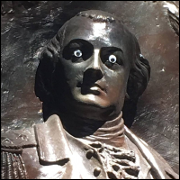|
Gosh, I wonder who will possibly win this time?
|
|
|
|

|
| # ? May 10, 2024 00:27 |
|
Empress Theonora posted:Gosh, I wonder who will possibly win this time? I'm curious how many posters would have defected to Fremont if he had not suspended his campaign.
|
|
|
|
QuoProQuid posted:I'm curious how many posters would have defected to Fremont if he had been a candidate. That could well have thrown the election, honestly. Who doesn't love Our Glorious Freemounter?
|
|
|
|
I'm voting Fremont as my write in candidate, sorry Abe
|
|
|
|
I'm writing in Karl Marx/Friedrich Engels. tia.
|
|
|
|
drat it, Fremont, you would've had this in the bag.
|
|
|
|
Lincoln/Johnson '64.
|
|
|
|
|
For a moment there I was worried I’d have to choose between Frémont and Lincoln. Frémont was such a good guy for sparing America that choice.
|
|
|
|
I think it would be fair to give the other side a chance to govern so I voted for McClellan.
|
|
|
|
QuoProQuid posted:I'm curious how many posters would have defected to Fremont if he had not suspended his campaign.  Fremont's my kind of guy, if the opposition propaganda is to believe, but if Lincoln is willing to slaughter the masses to crush a slave state under his boot-heel, well, then he's fine by me. Also, I'd just like to say, one of the interesting things about following this thread is watching the map of the USA develop. I find it kind of fascinating that, by 1865, not only do we already have the entire lower 48, but that other than partitioning the Dakota Territory, we have all the internal borders as well. I think I imagined the west stayed unorganized longer. Vavrek has issued a correction as of 22:47 on Apr 3, 2016 |
|
|
|
To be fair, even if Fremont were running, I'm pretty sure so few of us would have voted for loving McClellan he or Lincoln still would have won.
|
|
|
|
A vote for Lincoln is a vote for his very death.   
|
|
|
|
Lincoln is alright by me, but I don't trust Johnson at all. No Southern scoundrels in the White House, that's my opinion! I know he's getting on in years, but why couldn't Lincoln have picked a true believer again this time for VP like Thaddeus Stevens? Or even Benjamin Wade? Sigh, what could've been.
|
|
|
|
if he hadn't picked the only high-profile southern politician to denounce secession as vp, and split democratic sympathies by making it a 'national unity' ticket, lincoln would've had a really hard time getting reelected. avoiding overcommitting to non-racist the seige of atlanta helped a lot but they couldn't have planned for the timing of that
|
|
|
|
lambeth posted:Lincoln is alright by me, but I don't trust Johnson at all. No Southern scoundrels in the White House, that's my opinion! I know he's getting on in years, but why couldn't Lincoln have picked a true believer again this time for VP like Thaddeus Stevens? Or even Benjamin Wade? Sigh, what could've been. In the late summer of 1864, there was a good loving chance the Republicans were going to lose the election. A big part of that was because despite the Union's territorial gains and tremendous victories of the year before, the summer of 1864 was exceptionally bloody with seemingly little to show for it. Grant had taken the Army of the Potomac right up into Lee's face and ground him all the way down to Petersburg, but he lost tens of thousands of men doing it-and the Eastern press was quick to label him as a butcher who didn't care about casualties. In the Western theater Sherman had made tremendous progress towards Atlanta, but his campaign had seemingly stalled out against a skillful Confederate defense and constant attacks against his supply lines. To the average joe, the Union's not in a much better place than they were an entire year ago, and Gettysburg and Vicksburg are beginning to look like flukes. To make matters even worse, while the Draft isn't quite as contentious as it had been the previous year, it's still about as popular as it would be a hundred years later in 1968-for many, a vote against the War might as well be a vote to save their own skins, or those of friends or loved ones. And of course you've got McClellan. Up until he got fired he was one of the most successful Union generals in the East, and was one of the very few Union commanders to win a major battle against Lee (Who was basically legendary at this point). He was also exceptionally popular with his men, which the Republicans feared was going to be A Problem in an election where the soldiers themselves made up a good portion of the electorate. With him leading the ticket, so long as the Union remained outside Atlanta and Petersburg the Democrats could convincingly argue that the war was militarily unwinnable, and the only option was a negotiated peace. So, of course, Lincoln hedged. By selecting Johnson instead of a Radical Republican, Lincoln was basically playing to the middle, stating that winning the war was the main objective instead of freeing the slaves or-god forbid!-giving them citizenship (Which was still a very controversial subject). Of course, he was also helped by McClellan's muddled platform that wasn't quite peace, but wasn't quite war, though the final nail in the coffin was the capture of Atlanta in September (Which effectively signaled Game Over for the Confederacy-it was one of their largest cities and one of their very few transportation hubs. Once it was taken, the Southern rail system collapsed). And to cap it off, when the soldiers did send in their ballots, they voted overwhelmingly for Lincoln-after all of their sacrifices over the past three years, they wanted to make drat sure they finished the job. So basically, while selecting Johnson ended up being unnecessary to win the election, the decision was made when it seemed like it might be-and unfortunately, we all know how it ended. Acebuckeye13 has issued a correction as of 01:24 on Apr 4, 2016 |
|
|
|
I think in this time of turmoil, friends, we should remember this when talking about the south:quote:“Always remember: Others may hate you, but those who hate you don’t win unless you hate them, and then you destroy yourself.”
|
|
|
|
Great av/post combo.
|
|
|
|
You have McClellan listed as the Vice Presidential nominee. Confused me for a moment there. Let's look at things for a moment now, Lincoln has done what he needed to do that nobody else would do by this point. He's started the war against those drat traitors in the south, and doing a fine job, despite Buchanan's outright sabotage. He's passed his emancipation proclamation, which means the main purpose of the republican is fulfilled, right? Slaves: Freed. So all that's left is to finish the war, which couldn't take too long, right? And even if the coup de grace isn't dealt by the time the next guy takes over, not even the damnable wishy-washiness of the democrats that we've come to know and love over these long decades can gently caress this up, because McClellan has declared that he will do what it takes to win this war. It's a win/win scenario! Besides, I like this precedent we can set for generals who have been fired for incompetence to go on to challenge the president, especially generals with ""mac" in their name! Imagine how our country could benefit from such a precedent 84 years hence! Now, who I don't like is this Pendleton fellow, but let's be real here, we know that there may be a danger of assassination attempts, but who do you really see as easier to kill? A general, or this loser who calls himself "Gentleman George?" And continuing on that line of thinking, if the vice president is easy to kill, that introduces a third dark horse option: If both McClellan and Pendelton kick the bucket, that means the presidency goes to the current Speaker of the House, none other than the founder of the Republican Party, Schuyler Colfax.
|
|
|
|
Weeeeell...  Even after the Emancipation Proclamation, the future of slavery in the US was still an undecided issue. Infamously, the proclamation only freed slaves in territory occupied by the Confederacy at the time of its issue, and was explicitly a wartime measure that was justified as economic warfare against the South. In Maryland, Delaware, Missouri, and the wide swaths of occupied territory in the South, Slavery was still very much legal-and Lincoln himself knew that the Proclamation wasn't going to hold any water after the war-and if McClellan had gotten into office, he could have easily rescinded it. The only thing that would guarantee the end of Slavery was a constitutional amendment, which required a 2/3 majority in the House and Senate that the Republicans didn't yet have. So if you want to vote for Slavery to die and stay dead, vote for Lincoln. And besides, you'll have a much better general to vote for in the next election  Edit: It really can be safely said that the 1864 campaign was probably the single most important series of elections in American history. Not only do you have the race of Lincoln against McClellan for the fate of the country, but you also have the hundreds of state and local level elections that would decide the makeup of the House and Senate. These elections were, if anything, even more important-not only did they pass the 13th Amendment (Literally the first amendment to be successfully added to the Constitution since Jefferson's presidency 60 years prior), but in the face of Johnson's obstinacy they became the driving force behind Reconstruction-and in the process passed the 14th Amendment, which is hands-down the single most important document in American history outside of the Constitution and Bill of Rights. Acebuckeye13 has issued a correction as of 15:41 on Apr 4, 2016 |
|
|
|
Also I know the book is closed on this one but jesus christ Buchanan Why isn't this guy ever trotted out as an appeasement villain? I'm glad even his own cabinet was disgusted with him.
|
|
|
|
lambeth posted:Lincoln is alright by me, but I don't trust Johnson at all. No Southern scoundrels in the White House, that's my opinion! I know he's getting on in years, but why couldn't Lincoln have picked a true believer again this time for VP like Thaddeus Stevens? Or even Benjamin Wade? Sigh, what could've been. It's ok, he's just there to capture some votes, he's unlikely to ever hold any real power in Three Term Lincoln's presidency.
|
|
|
|
Nebakenezzer posted:Also I know the book is closed on this one but jesus christ Buchanan On paper Buchanan looks great. lawyer, veteran of 1812, 4 term congressman, senator, ambassador to Russia, ambassador to the UK, and Secretary of State. In practice though... Add that half his cabinet was plotting against him. (To quote Grant's memoirs) quote:Meanwhile the Administration of President Buchanan looked helplessly on and proclaimed that the general government had no power to interfere; that the Nation had no power to save its own life. Mr. Buchanan had in his cabinet two members at least, who were as earnest—to use a mild term—in the cause of secession as Mr. Davis or any Southern statesman. One of them, Floyd, the Secretary of War, scattered the army so that much of it could be captured when hostilities should commence, and distributed the cannon and small arms from Northern arsenals throughout the South so as to be on hand when treason wanted them. The navy was scattered in like manner. The President did not prevent his cabinet preparing for war upon their government, either by destroying its resources or storing them in the South until a de facto government was established with Jefferson Davis as its President, and Montgomery, Alabama, as the Capital. The secessionists had then to leave the cabinet. In their own estimation they were aliens in the country which had given them birth. Loyal men were put into their places. Treason in the executive branch of the government was stopped. But the harm had already been done. The stable door was locked after the horse had been stolen. Nckdictator has issued a correction as of 00:05 on Apr 5, 2016 |
|
|
|
Nckdictator posted:On paper Buchanan looks great. lawyer, veteran of 1812, 4 term congressman, senator, ambassador to Russia, ambassador to the UK, and Secretary of State. In practice though... Plus Breckenridge, his VP, is going to Go South to serve as a General in
|
|
|
|
karmicknight posted:I'm writing in Karl Marx/Friedrich Engels. tia. In that case you may want to consider voting for the guy Karl Marx endorsed: It was Lincoln. Actually, you might even say that Marx was as much a fan of Old Abe as the rest of us: quote:We congratulate the American people upon your re-election by a large majority. If resistance to the Slave Power was the reserved watchword of your first election, the triumphant war cry of your re-election is Death to Slavery. Here's the full letter: https://www.marxists.org/archive/marx/iwma/documents/1864/lincoln-letter.htm While this letter is a source of infinite joy to me, I have to accept the fact that I had been wrong when discussing Marx's legacy in the past. After all, I have to admit now that the conservatives were right all along: Marx did support an authoritarian, fanatical and immoral political party at one point. While his intentions may have been pure, we should never forget the dark and destructive political legacy of the Republican Party. The fact that they only showed their truly and utterly vile face after his death only partially exhonerates him of his previous support.
|
|
|
|
Write in campaign for Lincoln/Fremont starts here <<<<<<<<
|
|
|
|
Ibogaine posted:In that case you may want to consider voting for the guy Karl Marx endorsed: It was Lincoln. This is the best goddamn thread.
|
|
|
|
Thank you for voting. In a landslide, His Elective Majesty Abraham Lincoln has won re-election. There is no doubt that Lincoln will serve a long, healthy, and fulfilling life. Surely, the next few years will see many outstanding changes, including the peaceful reintegration of the South, the enfranchising of freed slaves, and the prosecution of former Confederate leaders. Also, Andrew Johnson has been elected Vice-President. Hopefully, he will enjoy four years of being politically irrelevant! MOST POPULAR TICKET: Abraham Lincoln / Andrew Johnson (National Union) - 70 votes (89.7%) George B. McClellan / George H.Pendleton (Democratic) - 8 votes (10.3%) TOTAL: 78 votes
|
|
|
|
ELECTION OF 1868 Click here to vote in the Election of 1868! Click here to vote in the Election of 1868!   Background: On 15 April, 1865, John Wilkes Booth assassinated Abraham Lincoln while the latter was attending a play. For a country which had hoped to put the horrors of the Civil War behind it, the assassination was a tragedy beyond measure. Worse, the assassination flung Andrew Johnson, Lincoln’s much-ignored Vice-President, into a position of power and authority. At Lincoln’s funeral, Commanding General of the United States Army, Ulysses S. Grant, stood alone and wept openly. To his wife, he cried that, “Reconstruction has been set back no telling how far.” In many ways, Grant was right. For the remainder of Johnson’s presidency, the sole issue was Reconstruction, the effort to bring the South back into the Union. While Radical Republicans pushed for stringent measures that would institute civil rights for newly freed slaves and disenfranchise ex-Confederate leaders, Johnson wanted to bring the South back into the nation as quickly as possible. Johnson had relatively little interest in helping former slaves, seeing their freedom solely as a way of punishing the South, and hoped to maintain the electorate’s exclusively white character. Johnson pushed against the Republican Congress’s attempts to enfranchise freed blacks and took advantage of Congress being in recess to push through his own policies. These included thousands of pardons and allowing the South to set up “black codes,” which was seen as slavery under another name. When Congress came back into session, its leaders were furious and took steps to limit the President’s authority. Over the President’s public condemnations, Congress passed the Freedmen’s Bureau Bill, which provided shelter and provisions for former slaves and explicitly granted them equal rights in the courts. It also passed the Civil Rights Act, which defined all persons born in the United States as citizens, and the Fourteenth Amendment, which authorized the federal government to protect the rights of all citizens. In an attempt to counteract these measures and preserve his authority, Johnson took to the road, intending to rally the public onto his side. The strategy was a disaster. Johnson, obviously drunk, used racial slurs, profanity, and abusive language to attack his Republican opponents. In 1866, the Radical Republicans experienced landslide victories across the country. Johnson further worsened his position by attacking Grant, the beloved Civil War General, after the latter refused to help Johnson attack the Republican Congress. In Congress, Johnson became known as the Republican Party’s best campaigner. Having lost all use, the Republican Party put in motion a plan to remove Johnson from office. Believing the Tenure of Office Act, which limited the President’s ability to remove officials, unconstitutional, Johnson fired Secretary of War Edwin Stanton, who in turn barricaded himself in his office and refused to recognize the President’s order. Congress immediately voted to impeach Johnson, citing his violation of the Act, and used the press to publicly defame him. Though Johnson survived removal by just one vote, he ceased to be a threat to the Congress and allowed it to pass whatever bills it wanted unimpeded. With Johnson incapacitated, both parties began planning for the upcoming election. On the Republican side, General Ulysses S. Grant secured the nomination with a promise to continue the work that Lincoln had started. On the Democratic side, convention chairman and Governor of New York Horatio Seymour, who had previously declined an offer for the nomination, was chosen. Initially, Grant saw no need to campaign as everyone already knew who he was. Further, he saw competing with Seymour, a white supremacist with a checkered past who accused Grant of being a “friend of the family lover” with an illegitimate Indian lovechild, to be below his dignity. After the Democrats started making startling gains across the country, however, Grant mobilized his proxies to fight back. Seymour was linked to the failed Southern rebellion and implied to be a member of an elaborate cabal that intended to bring back the era of Southern supremacy. Meanwhile, both sides struggled to court the new black vote. Grant was forced to explain why his support for black civil rights seemed to end at the Mason-Dixon Line. Democrats published editorials like, “The Coloured Voter: A Sober Appeal to His Interests and His Sober Reason,” which told former slaves that they should support the Democrats because, “if your state and her sister Southern states had not seceded from the Union, you would not today be free.” On both sides, blacks who attempted to exercise their right to vote faced violence and suppression. REPUBLICAN PARTY NOMINEES:  Presidential Nominee: Ulysses S. Grant
 Vice Presidential Nominee: Schuyler Colfax
DEMOCRATIC PARTY NOMINEES:  Presidential Nominee: Horatio Seymour
 Vice Presidential Nominee: Francis P. Blair, Jr.
|
|
|
|
I kinda wish there were a third party this cycle. Grant's heart approximates being in the right place*, but god drat does he have bad taste in friends. *it's on the correct shelf, but it's in a separate bottle, preserved in ethanol
|
|
|
|
Haha Seymour you piece of poo poo *pulls for Grant*
|
|
|
|
Octatonic posted:I kinda wish there were a third party this cycle. Grant's heart approximates being in the right place*, but god drat does he have bad taste in friends. Grant believes in the goodness of all non-Confederate people. Surely, no one would betray his trust and confidence.
|
|
|
|
The only way I can make this election palpable is by reminding myself that I don't know about the people surrounding Grant yet. So, yeah, Grant and a cross-eyed first lady it is.
|
|
|
|
You thought the Civil War would bring an end to boring elections with, at most, only one non jackass candidate? Guess again, this ride never ends!
|
|
|
|
Did you know that Grant is a drunkard who needs alcohol to cope with the horrors of war? Is that really the kind of role model that you want your children to look up to? Also, I heard that he's a Catholic atheist who fathered at least six illegitimate biracial children. Anyways, I'm going to vote for this guy: 
|
|
|
|
QuoProQuid posted:Also, I heard that he's a Catholic atheist who fathered at least six illegitimate biracial children. But is he a Mason?
|
|
|
|
Franco Potente posted:But is he a Mason? No, but his father and two of his brothers are. They say that Grant wanted to join but was to busy with the military and politics. Schuyler Colfax is a member of that accursed lodge, though.
|
|
|
|
Grant/Blair. Two generals are better than one.
|
|
|
|
QuoProQuid posted:Did you know that Grant is a drunkard who needs alcohol to cope with the horrors of war? Is that really the kind of role model that you want your children to look up to? To be honest, this sounds like a nice callback to the Free Love Fremont days and the glories of our youthful HARD CIDER. Thank you for helping me put my fears about Grant to rest, fellow citizen!
|
|
|
|
QuoProQuid posted:which told former slaves that they should support the Democrats because, “if your state and her sister Southern states had not seceded from the Union, you would not today be free.” I want to shake the hand of whoever came up with this amazing example of being technically correct.
|
|
|
|

|
| # ? May 10, 2024 00:27 |
|
John Dough posted:I want to shake the hand of whoever came up with this amazing example of being technically correct. It truly is the best kind of correct. So, we're all on the same page and voting for the political neophyte general, right? Because I'm pretty sure the only thing I object to about Grant, aside from the fact that it might take him some time to cut his teeth before he can really get work done this term, is that he is against fiat currency, a cause I support.
|
|
|



































